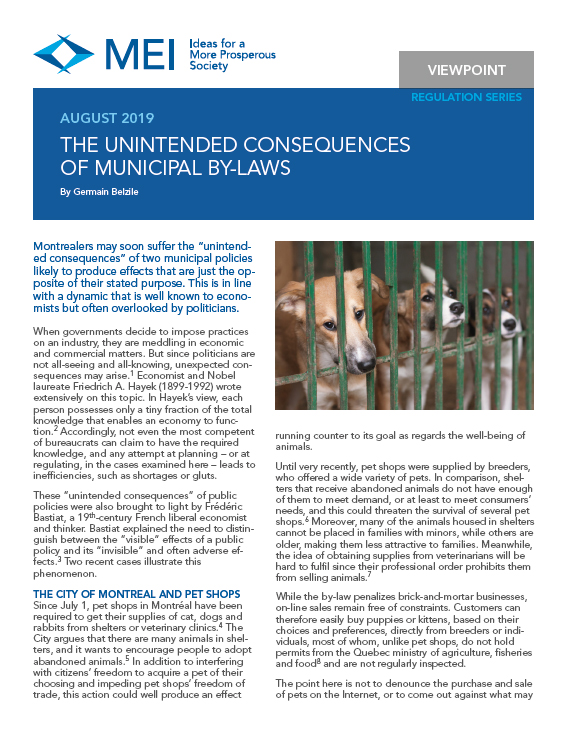Municipal by-laws in Montreal: when the left hand can’t tell what the right hand is doing

Montreal, August 1, 2019 – An MEI publication issued today highlights the contradictions we face from two recent policies put forward by the City of Montreal. Both the by-law aimed at controlling the sale of domestic animals and a recommendation to restrict the distribution of advertising flyers could create more problems than they solve.
“In the film Forrest Gump, it is said that life is like a box of chocolates: ‘You never know what you’re gonna get.’ The same often applies to public policies promoted by our politicians,” says Germain Belzile, Senior Associate Researcher at the MEI. “The effects of these policies often surprise us, and they even surprise the people who originated them!”
A new by-law requires pet shops located in Montreal to get supplies of animals from shelters and veterinarians. Not only does the veterinarians’ code of ethics prohibit them from selling animals, but the animals available at shelters are not necessarily what buyers want. Pet buyers make their choices based on their family situation, age, available space and an array of preferences.
According to a document submitted in court, the Society for the Prevention of Cruelty to Animals (SPCA) recently offered only seven dogs for adoption. Considering the large number of buyers in Montreal, it is easy to see that the supply may deviate sharply from consumers’ preferences and may even cause some pet shops to go out of business.
“Not only does this measure prevent people from choosing their pets freely, but it could also encourage buyers to go directly to breeders with lower standards or even to ‘puppy mills,’ ” Mr. Belzile notes. “Despite good intentions, the by-law could actually cause harm to animals.”
Meanwhile, the Montreal Metropolitan Community is recommending that the distribution of advertising flyers be based on a “voluntary rather than systematic approach.” This amounts to saying that distribution would be allowed only to citizens who specifically request it.
The aim of this policy is to reduce the consumption of printed products. But it could also end up reducing the circulation of local weekly newspapers distributed in Publisac bags and by similar means, adding a further threat to the survival of these institutions.
“By forcing a reduction in the circulation of local weeklies in this way and pushing up their distribution costs, we risk causing newspaper businesses to close,” Mr. Belzile states. “This is in direct contradiction with the aims of the provincial and federal governments, which are preparing to provide hundreds of millions of dollars in subsidies to keep them afloat.”
A basic principle of medical science applies perfectly to the public policy field: first, do no harm.
The Viewpoint titled “The Unintended Consequences of Municipal By-Laws” is written by Germain Belzile, Senior Associate Researcher at the MEI. This publication is available on our website.
* * *
The MEI is an independent public policy think tank. Through its publications and media appearances, the MEI stimulates debate on public policies in Quebec and across Canada by proposing reforms based on market principles and entrepreneurship.
-30-
Interview requests: Pascale Déry, Vice President, Communications and Development, MEI. Tel.: 514-273-0969 ext. 2233 / Cell: 514-502-6757 / Email: pdery@iedm.org

